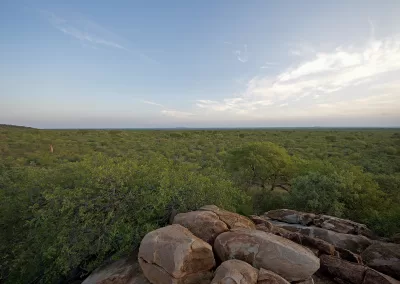History
In the 19th Century the first Europeans arrived, and the Tuli Block became a legendary hunting ground and a trade route, but territorial clashes soon occurred across Southern Africa between African tribes, the Boers and various European powers. To prevent territorial gains by the Boers and Germans, the British established the Bechuanaland Protectorate, covering modern-day Botswana, in 1885. Cecil Rhodes, head of the British South Africa Company (BSAC), wanted the entire Bechuanaland Protectorate transferred to BSAC but 3 DiKgosi (Chiefs) of prominent tribes visited Queen Victoria in London to ask her to intervene on their behalf. As a result of the visit of Khama III, Bathoen I and Sechele I, only the Tuli Block was transferred to BSAC for Rhodes’ planned Cape to Cairo railroad. Cecil Rhodes & BSAC continued their territorial advances and used the Tuli Block as a staging post for the Pioneer Column in 1890 which resulted in the creation of Southern and Northern Rhodesia (modern-day Zimbabwe and Zambia). The area was also the site of the most northerly actions in the Boer War at the turn of the century. Although Rhodes’ planned Cape to Cairo railway was never built, the property rights he obtained remained in effect, and the Tuli Block was eventually divided into farms and sold to private buyers most of whom migrated from South Africa. Even today the Tuli Block remains one of the few places in Botswana where non-citizens can own freehold property.
The land which now forms Limpopo-Lipadi was one of those farms, owned by the Van Niekerk family. In 2002, upon the passing of the senior member of the family, a portion of the farm was put up for sale and was acquired by a group of South Africans with a vision of converting it into a wildlife and wilderness reserve. By offering shares to like-minded investors with an interest in conservation, funds were raised to begin the process of rewilding the land. Along the banks of the Limpopo River lodges were built, allowing co-owners the use of seven 2- and 3-bedroomed lodges. Wildlife populations were replenished and species like the endangered white rhino and wild dog were re-introduced. Slowly, Limpopo-Lipadi came into being, named after two geographical features – the Limpopo River which forms the reserve’s eastern boundary, and Lipadi Hill, the highest point in the reserve.
A lot has been accomplished over the years, but there is still much to be done, we invite conservation-oriented investors and visitors to join us as we realise our vision for Limpopo-Lipadi.
Vision
We are custodians of a remarkable 20,500-hectare Reserve, full of natural biodiversity, distinctive topographical features and 14 kilometres of exceptional Limpopo River frontage. We are conscious of our duty to conserve the land, continue the rewilding process, protect endangered species, and share the idea that conservation of habitat and wildlife is of value to all.
Limpopo-Lipadi also has a social responsibility to be a good neighbour and benefit the region as a whole. We seek to achieve this by creating employment opportunities and uplifting local communities through our contributions to the Motse Committee – a Botswana-registered corporation working in the education and healthcare sectors.
Lastly, Limpopo-Lipadi is a refuge for both its co-owners and others who visit, because here, the African bush can be enjoyed at your own pace. Unique experiences are available such as game counts; involvement in conservation projects; rhino walks; bush braais (barbeques); sleeping out in a fly camp or just communing with a group of like-minded co-owners over breakfast, sundowners or dinner.




